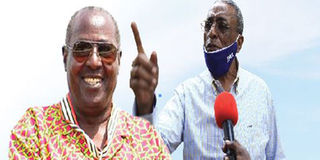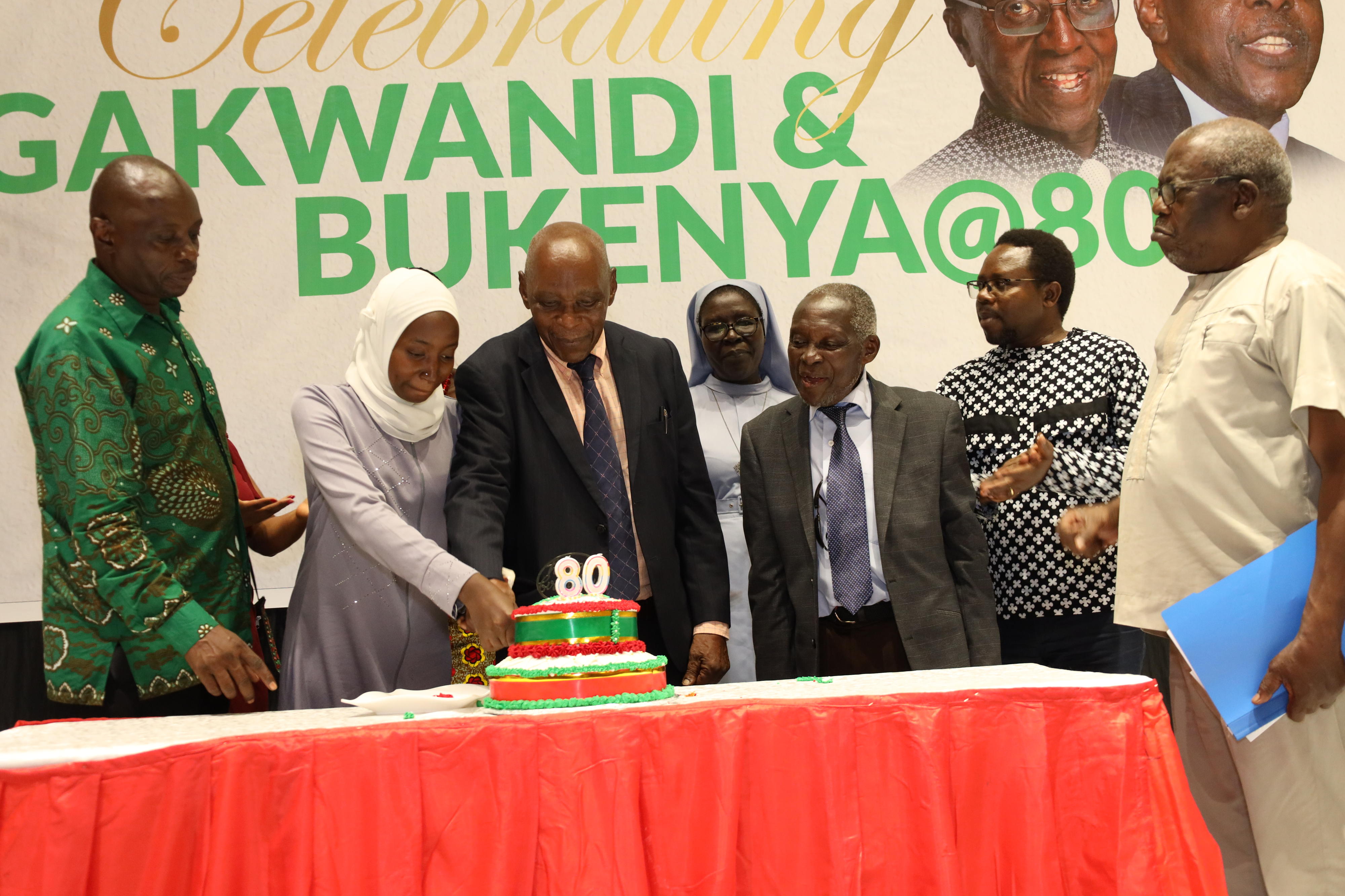Old rivalries renewed as Babu, Kigongo lock horns in NRM polls

Hajj Moses Kigongo (left), the vice chairman of the National Resistance Movement and Francis Babu. FILE PHOTOS
What you need to know:
- Showdown. It is not clear whether NRM chairman Yoweri Museveni and his deputy Moses Kigongo entered an arrangement at some point that he would always occupy this position, but none of the former Bush War fighters has ever dared to challenge him for it since 2005 when multiparty politics was reintroduced.
In January 1991, President Museveni reshuffled his Cabinet, elevating the late Dr Samson Kisekka to the position of vice president.
Since Mr Museveni had captured power five years earlier, he had not named a vice president and many regarded Hajj Moses Kigongo, the vice chairman of the National Resistance Movement (NRM) – the political arm of the National Resistance Army (NRA) that had captured power – as the de facto vice president. Dr Kisekka had been prime minister.
In addition to being vice chairman of NRM, Mr Kigongo was vice chairman of the National Resistance Council (NRC), the equivalent of Parliament at the time, which was also chaired by Mr Museveni.
In the 1991 reshuffle that was announced over radio, the list that was read out was of the vice president, prime minister and ministers, and Mr Kigongo did not feature anywhere. This development triggered a surprising development.
In Bulo Township, Butambala District, there were jubilations by some residents who thought Mr Kigongo had been dropped from government. Mr Kigongo’s birth place is a few kilometres from Bulo Township. These were early years of the NRM government and the fallout over the war that had brought the new outfit to power was still unfolding.
In the early 1980s, as different groups, including the NRA, waged war against Milton Obote’s second government, a gruesome incident happened in Bulo Township. One Eid day, as the faithful prayed, gunmen sealed off all entries/exits to the mosque and read out names of people they were interested in.
A number of men were rounded up and driven away. Their bodies were to be found abandoned a few kilometres away from the mosque on the road to Kampala, with necks severed like for beef animals.
This is one of the incidents of Uganda’s dark history that have never been conclusively investigated. The people who lost their loved ones in the incident were slow to warm up to the NRM government, whose army they suspect to have had a hand in the killing of their people. Those who were killed, elders in the area who don’t want to be named say, were known UPC supporters and agents.
They wanted answers regarding the incident the moment Uganda was ‘liberated’ by the NRA/NRM, but those answers had not come in the first five years, and many of them grew increasingly embittered towards Mr Kigongo, whose positioning in the new government they perhaps thought would enable him to resolve the puzzle of who killed their loved ones.
When Mr Kigongo heard of the celebrations of his presumed sacking from government in his hometown, he used one of his visits to the area to make an important clarification.
He told a motley crowd, according to three men who were in attendance: “I am told some of you were here celebrating that I had been sacked from government. Let me tell you this; for as long as Afande Museveni is still in power, I will be vice chairman of NRM. I was never vice president. I have always been vice chairman of NRM, and I continue to occupy that position.”
True to his word, Mr Kigongo has continued to occupy the position of vice chairman of NRM. And even when the vice chair was split to cater for women with the creation of the position of second vice chairperson (now occupied by Speaker Rebecca Kadaga) and vice chairs for each region, Mr Kigongo remained first vice chairman.
Enter Babu
It is not clear whether President Museveni and Mr Kigongo entered an arrangement at some point that he would always occupy this position, but none of the former Bush War fighters has ever dared to challenge him for it since 2005 when multiparty politics was reintroduced.
The media-shy Kigongo is very well regarded within the historical hierarchy of the ruling group, although very little has been documented about his contribution to the war that brought them to power. He was not a regular fighter in the war and was hardly on the frontline, and all that has been said about him is that he helped coordinate intelligence and logistics.
The reclusive ruling party oligarch is now up against former minister Francis Babu, a straight-talker who in the past has had some social clashes with Mr Kigongo and those in his circles. In the campaigns for the elections to the Constituent Assembly (CA) in 1993, Mr Babu clashed with the late Hajj Abbey Kafumbe Mukasa, then deputy minister of Finance and a close confidant of Mr Kigongo, with whom they originated from neighbouring villages.
During the bitterly fought campaign, Mr Babu punched Kafumbe during a joint candidates’ meeting, accusing the latter of referring to his parentage in a demeaning manner. Mr Babu eventually ran away with the Kampala Central seat for the CA, and he went on to represent the constituency in Parliament until he was defeated in 2001.
Mr Babu would also become vice chairman for Kampala, which is considered an independent region by the NRM party, until he lost the slot to Kampala Central MP Muhammad Nsereko in 2005. He would become estranged from his party, accusing it, in particular former prime minister and NRM secretary general Amama Mbabazi, of sidelining him to hand the party flag for the Lord Mayor seat in 2011 to Mr Peter Ssematimba.
Mr Babu has since been out of official assignment and every now and again calls out the party when he thinks things are going wrong. He now goes for the party’s second highest seat, a seat which has never been competed for since NRM became a party in 2005. It is one of the top positions, including that of party chairman, which have always been filled whose incumbents have always gone unchallenged.
For Mr Babu to compete against Mr Kigongo, the party’s Central Executive Committee (CEC), will have to approve him. Whereas CEC has in the past disqualified some party members from competing for positions, especially those who have sought to compete against President Museveni, disqualifying Mr Babu – who has been a CEC member in the past – would be a long shot.
The other possibility is mediation, and President Museveni often mediates between rivalling members at this stage. It remains to be seen how it will end, but the prospect of a showdown between Mr Kigongo and Mr Babu is mouth-watering.




